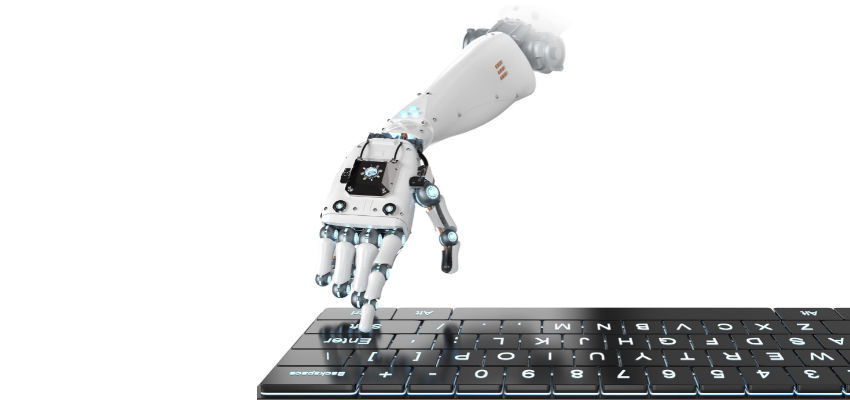Show:
The Future of AI Application Development
Artificial intelligence has evolved from a futuristic concept to a tangible reality, reshaping industries and transforming how we live and work. This rapid advancement has been driven by significant breakthroughs in machine learning, deep learning, and neural networks, which have enabled AI systems to perform complex tasks with increasing accuracy and efficiency. The artificial intelligence market size is expected to reach USD 12.43 billion by 2030.
As technologies continue to advance at an unprecedented pace, the future of AI application development holds immense promise. The integration of artificial intelligence into various sectors such as healthcare, finance, manufacturing, and transportation is expected to bring about revolutionary changes.

In the healthcare industry, AI is being used to enhance diagnostic accuracy, predict patient outcomes, and personalize treatment plans. In finance, implementing artificial intelligence algorithms are optimizing trading strategies and improving fraud detection. The manufacturing sector is leveraging intelligent systems for predictive maintenance and quality control, while autonomous vehicles and smart traffic management systems are transforming transportation. Moreover, the development of AI ethics and governance frameworks is crucial to ensure the responsible and fair deployment of technologies. As these advancements continue to unfold, the potential to create new opportunities and solve complex problems is virtually limitless.
The Rise of Emerging AI Technologies
The evolution of intelligent systems is marked by the occurrence of groundbreaking technologies that are pushing the boundaries of what’s possible. Here are some of the most promising developments:
Generative AI: Models like GPT-4 can create realistic text, images, music, and even code. This opens up a wide array of applications, from content creation and design to personalized experiences and creative problem-solving.
Explainable AI (XAI): As systems become more complex, understanding their decision-making processes becomes crucial. XAI focuses on making artificial intelligence transparent and interpretable, ensuring accountability and trust in AI-driven apps.
Federated Learning: This approach allows AI models to be trained on decentralized data sources while preserving privacy. It’s particularly relevant for healthcare, finance, and other industries where data sensitivity is paramount.
Neuromorphic Computing: Inspired by the human brain, this technology aims to create more energy-efficient and adaptable AI hardware. This could lead to powerful apps running on smaller devices.
Future AI Trends Shaping Application Development
Hyper-Personalization: AI will continue to drive tailored experiences across various domains, from e-commerce and marketing to healthcare and education. Nowadays 92% of companies use AI personalization for growth. Applications will leverage intelligent systems to tailor content, recommendations, and interactions to individual preferences and needs.
AI-Powered Automation: Mechanization of routine tasks will accelerate, freeing up human workers for more creative and strategic endeavors. AI-driven automation will extend beyond manufacturing and logistics to encompass a wide range of industries, including customer service, finance, and healthcare.
AI in Edge Computing: Apps will increasingly be deployed at the edge, closer to the data source. This will reduce latency, improve responsiveness, and enable real-time decision-making in applications like autonomous vehicles, robotics, and IoT devices.
AI for Social Good: AI will play a crucial role in addressing global challenges, such as climate change, healthcare disparities, and poverty. The apps will be developed to analyze data, optimize resources, and provide solutions for the improvement of society.

AI Frameworks and Tools: Building the Future
A robust ecosystem of AI structures and tools is empowering developers to build sophisticated applications with greater ease and efficiency. Popular frameworks like TensorFlow, PyTorch, and Keras provide the foundation for creating and training machine learning models, offering extensive libraries and pre-built functions that streamline the development process. These frameworks support a wide range of AI tasks, from natural language processing and image recognition to predictive analytics and autonomous systems. Additionally, they are highly customizable, allowing developers to fine-tune their models to achieve optimal performance for specific use cases.
Furthermore, cloud-based services from major providers like AWS, Azure, and Google Cloud are revolutionizing the way apps are developed and deployed. These platforms offer pre-built AI capabilities, such as computer vision, speech recognition, and natural language understanding, which can be easily integrated into applications without the need for extensive expertise. This simplifies the development process, reduces the time and cost involved, and enables faster deployment of AI solutions. Moreover, cloud-based services provide scalable infrastructure, ensuring that apps can handle varying levels of demand and continue to perform efficiently as they grow.
As the ecosystem of AI frameworks and tools continues to expand, developers are better equipped to harness the power of artificial intelligence and create innovative applications that drive progress across industries.
Innovations in AI Application Development
No-Code/Low-Code Development
These platforms democratize AI development by allowing individuals without extensive coding expertise to build apps. This opens up new opportunities for businesses and individuals to leverage artificial intelligence for their specific needs.
AI for Cybersecurity
Artificial intelligence is playing an increasingly critical role in online safety, with applications for threat detection, vulnerability assessment, and incident response. AI-powered security solutions can adapt to evolving threats, providing proactive protection for businesses and individuals.
AI in Healthcare
Intelligent systems are transforming this industry with apps for medical imaging analysis, drug discovery, personalized treatment plans, and patient monitoring. These innovations have the potential to revolutionize healthcare delivery and improve patient outcomes.
The Ethical Considerations of AI
The rapid advancement and widespread adoption of AI technologies bring about significant ethical challenges that must be carefully managed to ensure a positive impact on society. Issues such as bias in algorithms, data privacy, and the impact of AI on employment require careful attention from developers, organizations, and policymakers alike.
Bias in algorithms can lead to unfair and discriminatory outcomes, perpetuating existing inequalities and injustices. It is crucial for developers to implement rigorous testing and validation processes to identify and mitigate bias in their models. This includes using diverse and representative datasets, as well as incorporating fairness metrics to evaluate the performance of systems across different demographic groups.
Data privacy is another critical concern, as AI systems often rely on vast amounts of personal data to function effectively. Organizations must adopt robust data protection measures to safeguard user information and comply with privacy regulations. Transparent data handling practices and clear communication with users about how their data is used are essential for building trust and ensuring ethical AI deployment.
The impact on employment is a topic of growing concern, as automation and AI-driven technologies have the potential to displace jobs across various sectors. It is important for policymakers and organizations to develop strategies for managing this transition, including reskilling and upskilling programs to help workers adapt to the changing job market. Encouraging the creation of new job opportunities in emerging AI-related fields can also help mitigate the negative effects on employment.
Developers and organizations must prioritize responsible development practices to ensure that AI benefits society as a whole. This includes adhering to ethical guidelines, fostering interdisciplinary collaboration, and engaging with diverse stakeholders to address the broader societal implications. By proactively addressing these ethical considerations, we can harness the transformative power of AI while minimizing its potential risks, ultimately creating a more just and equitable future.
In Conclusion
The future of AI application development is bright and filled with immense potential. Emerging AI technologies, future trends, frameworks, tools, and innovations are poised to revolutionize industries and transform how we interact with the world. As artificial intelligence continues to evolve, its apps are becoming increasingly sophisticated, capable of addressing complex problems and driving significant advancements in various fields. From healthcare and finance to education and entertainment, AI is set to make a profound impact on our daily lives.
By embracing responsible development practices and focusing on applications that benefit humanity, we can unlock the full potential to create a better and more equitable future. This includes prioritizing solutions that address global challenges, such as climate change, healthcare accessibility, and social inequality. As we move forward, the collective effort of researchers, developers, policymakers, and society at large will be essential in ensuring that AI technology is harnessed for the greater good, paving the way for a brighter future.
Transform your business with cutting-edge solutions—partner with companies for expert AI application development today!

 Return to Previous Page
Return to Previous Page








